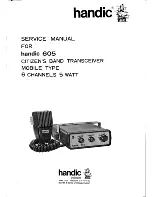
Section 4 - Lightning & Surge
Page 4-3
S1400T-2808B
4.1.2 Ground Propagation
As in any medium, a dynamic pulse, like R.F., will take time to propagate. This propagation
time will cause a differential step voltage to exist in time between any two ground rods that
are of different radial distances from the strike. With a ground rod tied to a struck tower,
the impulse will propagate its step voltage outwardly from this rod in ever-expanding
circles, like a pebble thrown into a pond. If the equipment house has a separate ground rod
and the power company and/or telephone company grounds are also separate, the dynamic
step voltage will cause currents to flow to equalize these separate ground voltages. Then if
the coax cable (associated with a radio) is the only path linking the equipment chassis with
the tower ground, the surge can destroy circuitry.
4.1.3 Tying it all Together
To prevent this disaster from occurring, a grounding system must be formed which
interconnects all grounds together. This will equalize and distribute the surge charge to all
grounds, and at the same time, it will make for a lower surge impedance ground system.
This interconnection can be done as a grid, where each ground has a separate line to each
other ground, or by using a “Rat Race” ring that forms a closed loop (not necessarily a
perfect circle) which surrounds the equipment house completely.
By making this interconnection, it will be necessary to use proper I/O protectors for the
equipment. Of course, these should be a requirement regardless of whether this grounding
technique is used. I/O protectors are used for power lines and telephone lines (even those
these don’t feed into a 2808 Transmitter) and also to minimize EMI pick-up from a strike.
Ideally it is best to place all I/O protectors on a common panel that has a low inductance
path to the ground system. 2808 Transmitters would then have a single ground point from
its Ground Terminal to this panel. In lieu of this, the 2808 Transmitter in question should
be tied to a ground rod that in turn is connected to the Earth/System Ground created for
the site.
Your protected equipment connected to a common single ground system will now be just
like a bird sitting on a high-tension wire. When lightning strikes, even with a 50 ohm surge
impedance ground system, the entire system consisting of equipment, ground system,
building, etc., will all rise together to the one million volt peak level (for example) and will
all decay back down together. So long as there is no voltage differential (taken care of by
protectors and ground interconnections, there will be no current flow through the
equipment and therefore no resulting equipment damage.
4.1.4 Impulse Protection Summary
i
Use more than one ground rod.
i
Place multi-ground stakes more than their length apart.
i
Tie Power, Telco, Tower, Bulkhead and equipment ground together.
i
Make all ground interconnect runs that are above ground with minimum radius
bends of eight inches and run them away from other conductors and use large solid
wire or a solid strap.
i
Watch out for dissimilar metals connections and coat accordingly.
i
Use bare wire radials together where possible with ground stakes to reduce ground
system impedance.
Summary of Contents for Bristol 2808 Series
Page 12: ...BLANK PAGE ...
Page 14: ...1 2 Introduction 2808B Figure 1 1 2808 XXB Transmitters ...
Page 16: ...BLANK PAGE ...
Page 30: ...BLANK PAGE ...
Page 32: ...1B 2 DP Transmitters 2808B Figure 1B 1 Model 2808 35B Figure 1B 2 Transmitter Assemblies ...
Page 40: ...1B 10 DP Transmitters 2808B Figure 1B 6 Transmitter Housing Rotation Diagram ...
Page 54: ...BLANK PAGE ...
Page 57: ...2808B Calibration 3 3 Figure 3 2 Calibration Adjustments ...
Page 60: ...3 6 Calibration 2808B TABLE 3 A COARSE ZERO SWITCH SETTINGS Elevation ...
Page 61: ...2808B Calibration 3 7 TABLE 3 B COARSE ZERO SWITCH SETTINGS Suppression ...
Page 66: ...BLANK PAGE ...
Page 68: ...4 2 Service 2808B Figure 4 1 Using Internal TEST Terminals to Measure Current ...
Page 72: ...BLANK PAGE ...
Page 74: ...BLANK PAGE ...
Page 90: ...BLANK PAGE ...
Page 92: ...BLANK PAGE ...
Page 100: ...BLANK PAGE ...
Page 128: ...BLANK PAGE ...
Page 139: ...BLANK PAGE ...
















































